2010 Value SSD (~$100) Roundup: Kingston and OCZ take on Intel
by Anand Lal Shimpi on June 3, 2010 12:01 AM ESTOverall System Performance using PCMark Vantage
Next up is PCMark Vantage, another system-wide performance suite. For those of you who aren’t familiar with PCMark Vantage, it ends up being the most real-world-like hard drive test I can come up with. It runs things like application launches, file searches, web browsing, contacts searching, video playback, photo editing and other completely mundane but real-world tasks. I’ve described the benchmark in great detail before but if you’d like to read up on what it does in particular, take a look at Futuremark’s whitepaper on the benchmark; it’s not perfect, but it’s good enough to be a member of a comprehensive storage benchmark suite. Any performance impacts here would most likely be reflected in the real world.
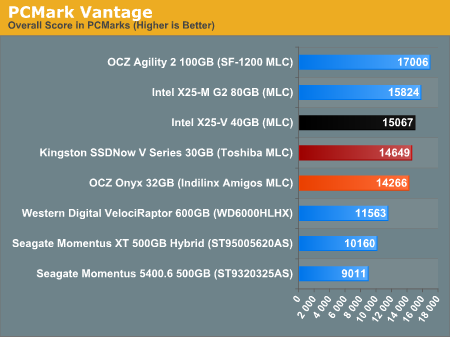
Combining sequential and random performance into a real world workload is what we get from PCMark Vantage. The overall score has Intel in the lead, followed by Kingston and finally OCZ's Onyx. The standings don't change in the HDD specific Vantage suite.
The memories suite includes a test involving importing pictures into Windows Photo Gallery and editing them, a fairly benign task that easily falls into the category of being very influenced by disk performance.
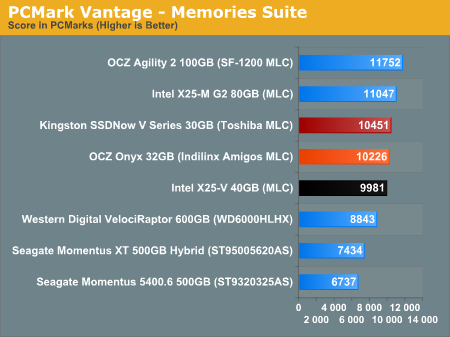
The TV and Movies tests focus on on video transcoding which is mostly CPU bound, but one of the tests involves Windows Media Center which tends to be disk bound.
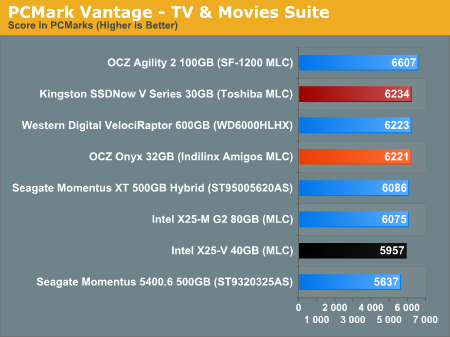
The gaming tests are very well suited to SSDs since they spend a good portion of their time focusing on reading textures and loading level data. All of the SSDs dominate here, but as you'll see later on in my gaming tests the benefits of an SSD really vary depending on the game. Take these results as a best case scenario of what can happen, not the norm.
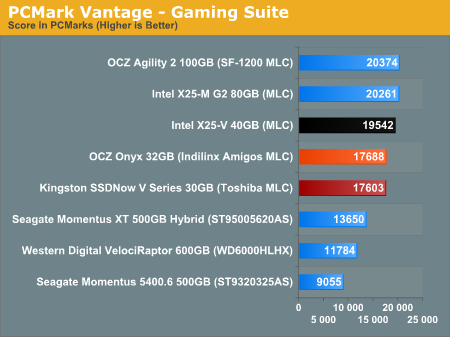
In the Music suite the main test is a multitasking scenario: the test simulates surfing the web in IE7, transcoding an audio file and adding music to Windows Media Player (the most disk intensive portion of the test).
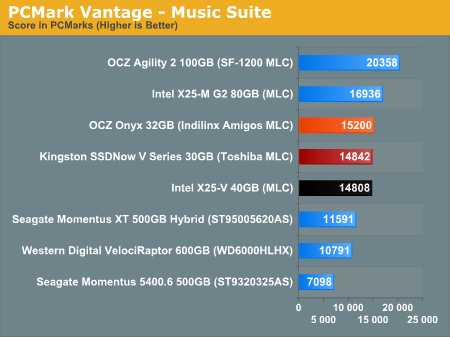
The Communications suite is made up of two tests, both involving light multitasking. The first test simulates data encryption/decryption while running message rules in Windows Mail. The second test simulates web surfing (including opening/closing tabs) in IE7, data decryption and running Windows Defender.
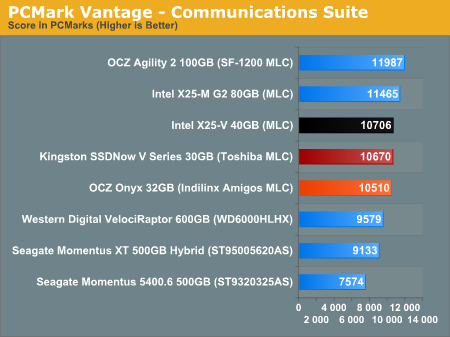
I love PCMark's Productivity test; in this test there are four tasks going on at once, searching through Windows contacts, searching through Windows Mail, browsing multiple webpages in IE7 and loading applications. This is as real world of a scenario as you get and it happens to be representative of one of the most frustrating HDD usage models - trying to do multiple things at once. There's nothing more annoying than trying to launch a simple application while you're doing other things in the background and have the load take forever.
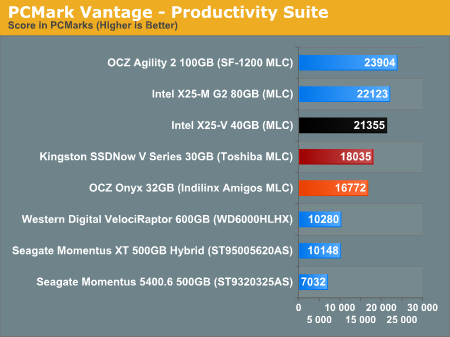
The final PCMark Vantage suite is HDD specific and this is where you'll see the biggest differences between the drives:
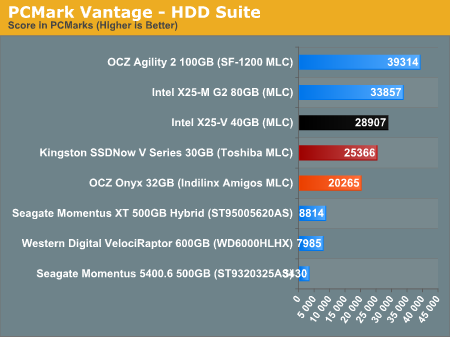










49 Comments
View All Comments
R-Smith - Tuesday, July 6, 2010 - link
+1Then again, the best idea might be to avoid an SSD because then PC's without SSD's won't seem so slow.
MobiusStrip - Monday, June 7, 2010 - link
"They simply are way to small" TOO. TOO small. T, O, Oracerx_is_alive - Thursday, June 3, 2010 - link
Seems like the 30GB OCZ Vertex is another good option in this price range. If its performance is anywhere close to the 120GB version in your SSD Bench, I wonder if it isn't a better option than the Onyx and the Kingston?Taft12 - Friday, June 4, 2010 - link
Performance of the 30GB Vertex is not close to the 120GB version.Mugur - Thursday, June 3, 2010 - link
Does the non-Intel drives have a tool equivalent with the Intel SSD Toolbox? I mean, if I'm not sure if TRIM works, I just run that utility (it takes about 3 seconds :-) )...Chloiber - Thursday, June 3, 2010 - link
The drives with Indilinxcontrollers (the normale one and ECO, I don't know about "Amigos" though!) have a "TRIM"-tool. You can manually trim under windows. It is beta though and should be used with care. For me, it always worked.Under Linux, you can issue a manual TRIM command anytime you want (google for hdparm and/or wiper.sh linux ). Also here, there are still problems, but again it worked for my Ultradrive perfectly well.
teohhanhui - Thursday, June 3, 2010 - link
And yes, I'll wait until the new Intel drives come out at the end of this year (presumably).Phate- - Thursday, June 3, 2010 - link
What about ssd's with the JMicron JMF612/JMF618 controllers? These are the real budget-ssd's, the Kingston SNV425-S2 64GB is by far the cheapest ssd (with only the 128GB version offering more GB/euro). And what about the Corsair Reactor Series R60, Corsair Performance series P64 and Corsair Extreme series E64. These drives have cost about the same as the Intel Postville 80GB when you look at GB/euro.I am not interested in the 30-40GB ssd's, they are to small. Neither am I interested in the high-end ssd's. I'm interested in an ssd with more then 40GB (and less then 80GB) with a decent capacity/performance/euro ratio.
Well to be precise, I AM interested in the smaller and faster ssd's, because ssd's interest me, and it are mostly wonderful articles, but these reviews hardly help me in my search for the perfect ssd for me. Namely the midrange.
loimlo - Thursday, June 3, 2010 - link
Kingston uses the same controller across their SSD series. In other words, SSDNOW V series 30/64/128GB drives share identical controller. You can base 64/128GB performance on Anand's 30GB review. That said, 64/128GB should be faster given higher read/write speed compared to 30GB version.Phate- - Thursday, June 3, 2010 - link
If so, then explain the difference between de V+ second series and the newer V second series. If they are exactly the same, why would they bother with releasing 2 exactly the same, but different named series?http://www.legitreviews.com/article/1197/1/
http://www.legitreviews.com/article/1237/7/
Too bad they didn't compare the ssd's with eachother though.